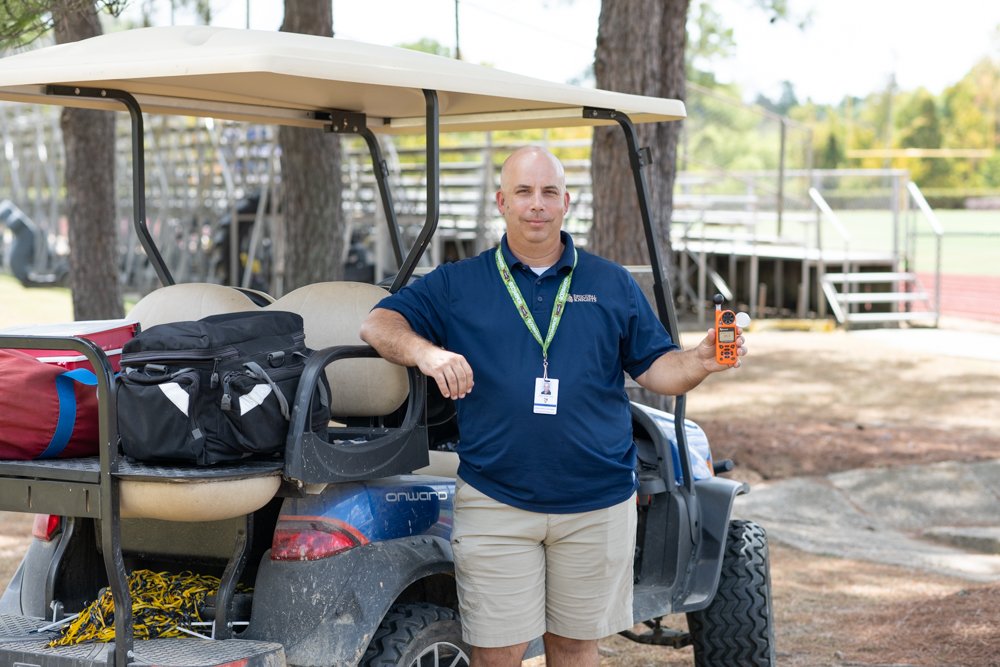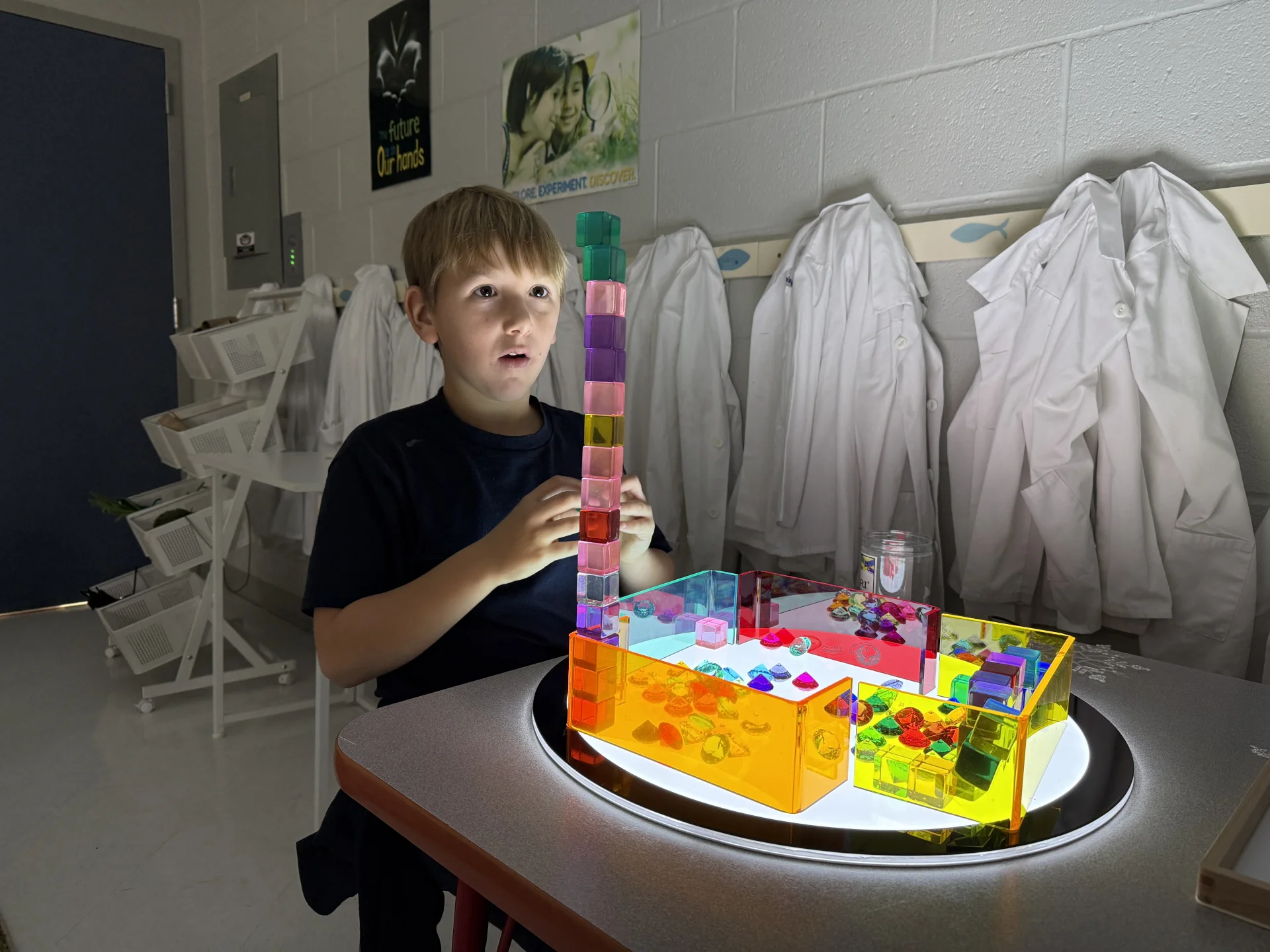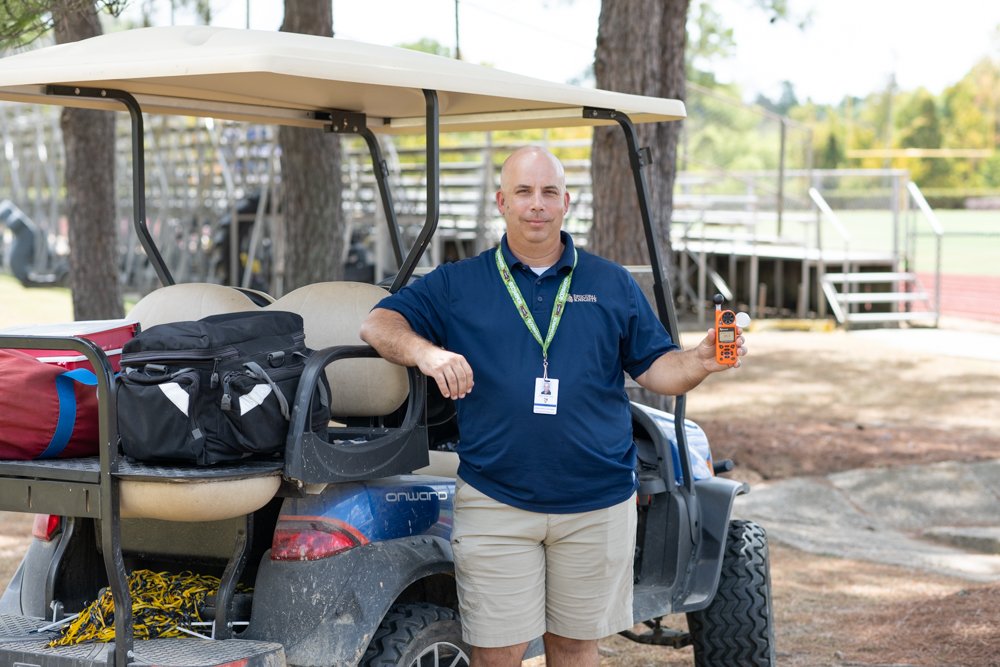- Admission
- Discover Episcopal
- Our Program
- Athletics
- Arts
- Spirituality
- Student Life
- Support Episcopal
- Alumni
- Parent Support
- Knightly News
- Contact Us
- Calendar
- School Store
- Lunch Menu
- Summer Camps
« Back
The Science of Athlete Heat Safety
August 24th, 2023

Acclimatization and wet bulb globe temperature might be terms in science class, but currently, they are buzzwords among Episcopal coaches and athletes as they begin fall sports in record-breaking heat. After nearly two decades with the Knights, Episcopal Athletic Trainer Dean Mannina is familiar with the heat precautions necessary in south Louisiana. “We’ve handled the heat very well,” he says. “Our coaches and kids do a good job.”
That job begins as soon as students begin fall camp. The National Athletic Trainers’ Association (NATA) has established guidelines for heat acclimatization that Mannina and the Episcopal teams follow. For example, when the Knights football team initially reported for practice, athletes wore helmets, shorts and t-shirts. Eventually, the squad added shoulder pads before moving on to full gear.
Mannina says all sports tailor their practices to help athletes adjust to the conditions and ease into the start of a new season. Teams take breaks every 15 minutes to allow athletes to hydrate and rest to bring down their heart rate. The cross country practice course consists of a 7 ½ minute run out and a 7 ½ minute run back, providing the runners that respite. Mannina says even the Episcopal swimmers take a break every quarter of an hour. Swimmers can also take a cool shower if they need help lowering their body temperature, and the practice pool is equipped with an aerator to assist with circulating water.
Hydration is another science-based component of athlete safety. Football players weigh in before and after practice to track how much fluid they’ve lost. Mannina says the recommendation is that they drink 16 to 24 ounces of fluids per pound lost. Those fluids may be water, sports drinks or even frozen sports pops. Mannina uses 25-gallon tanks he calls water cows to supply water to the practice field. This summer, the Knights have drained several water cows at each practice, consuming as much as 100 gallons of water in two hours.
As an athletic trainer, Mannina’s job is also team weather forecaster. Before athletes begin practice, Mannina can be found outdoors holding an orange wet bulb globe temperature calculator. He’s been using such a device for decades to calculate a reading that takes into consideration the temperature, humidity, wind speed, cloud cover and sun angle. Combined, this data provides a more accurate understanding of the conditions than temperature or heat index alone. The NATA established activity guidelines regarding wet bulb readings, and based on the numbers, athletic trainers determine the equipment players wear, how many breaks are needed and the length of practice. Recently, the wet bulb globe reading entered the hottest zone, requiring players in all sports to practice indoors. Flexible and resilient, coaches and athletes adjusted quickly and moved workouts into the Episcopal gyms.
The Fan Experience
When it comes to heat safety, Mannina also has advice for Episcopal fans. “It’s important to know what your body can handle,” he says to those planning to cheer on the blue and gold. “Spectators need to make smart decisions.” Those decisions include staying hydrated and recognizing when the heat is too much.
Whether a spectator or an athlete, Mannina says a heat-related injury is one of the most preventable, which is why he and the coaches continue to monitor the conditions. With careful preparation and a focus on safety, teams and fans can enjoy a great season even as the thermometer hits the triple digits.
Are you a veteran sports fan with tips for fellow fans to stay cool during sports events? Share your go-to best practices below.
You can access dates of upcoming sports events on the school’s calendar here or visit the athletics homepage and select your preferred sport to view that team’s schedule.
The Episcopal School of Baton Rouge 2025-2026 application is now available! For more information on the application process, to schedule a tour, or learn more about the private school, contact us at [email protected] or 225-755-2685.
Other articles to consider
 Jan28Episcopal to Host the 2026 CW Austin Learning Disabilities Conference
Jan28Episcopal to Host the 2026 CW Austin Learning Disabilities ConferenceEpiscopal hosts the 2026 CW Austin Learning Disabilities Conference, bringing families and educators together to explore ADHD, dyslexia, autism, mental health and learning strategies while highlighting the school’s commitment to supporting every learner.
See Details Jan28A Global Moment for a Growing Artist: Lower School Student’s Work Featured in the Louvre Exhibition
Jan28A Global Moment for a Growing Artist: Lower School Student’s Work Featured in the Louvre ExhibitionLower School recently celebrated a new student who achieved a tremendous milestone. The fourth grader’s artwork was featured in the Le Carrousel du Louvre exhibition!
See Details Jan28Play With Purpose: Lower School Students Enjoy New STEAM Stations
Jan28Play With Purpose: Lower School Students Enjoy New STEAM StationsEpiscopal first through third graders explore creativity and problem solving through new STEAM Stations in the QUEST Center.
See Details Jan23Behind Every Number: Humanizing the Holocaust Through Story and Study
Jan23Behind Every Number: Humanizing the Holocaust Through Story and StudyUpper School students explore the Holocaust through survivor stories, meaningful discussions, and a powerful visit with Chef Alon Shaya—deepening understanding, empathy and moral insight.
See Details
Categories
- All
- Admission
- Athletics
- College Bound 2019
- College Bound 2020
- College Bound 2021
- College Bound 2022
- College Bound 2023
- College Bound 2024
- College Bound 2025
- Counselors Corner
- Episcopal Alumni
- Giving
- Head Of School
- Lower School
- Middle School
- Spirituality And Service
- Student Work
- The Teachers' Lounge
- Upper School
- Visual And Performing Arts
Recent Articles
- 01/28/26Episcopal to Host the 2026 CW Austin Learning Disabilities Conference
- 01/28/26A Global Moment for a Growing Artist: Lower School Student’s Work Featured in the Louvre Exhibition
- 01/28/26Play With Purpose: Lower School Students Enjoy New STEAM Stations
- 01/23/26Behind Every Number: Humanizing the Holocaust Through Story and Study
- 01/22/26A Legacy in Layers: Episcopal Students 3D-Print a Battle Droid
- 01/22/26Houston Highlights: Seventh Graders Enjoy Regional Travel
- 01/16/26Episcopal Recognized Nationally with AP School Honor Roll Distinction
- 01/16/26Developing Tomorrow’s Leaders: Episcopal Excels at Youth Legislature










